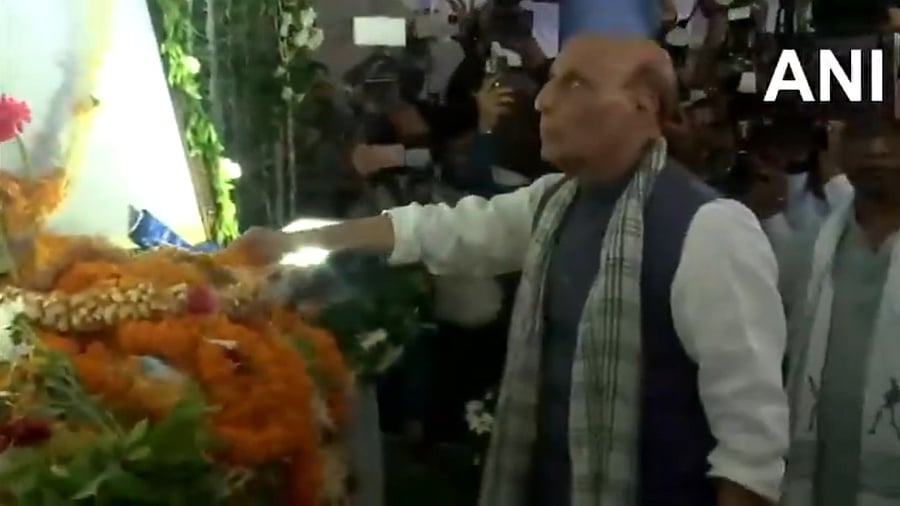
Defence Minister Rajnath Singh
Credit: X/@ANI
Ranchi: Defence Minister Rajnath Singh and yoga guru Baba Ramdev on Saturday visited tribal icon Shibu Soren's ancestral village Nemra in Jharkhand's Ramgarh district to attend his 'Shraddh' ceremony.
Apart from Singh, Minister of State for Defence, Sanjay Seth, Jharkhand Governor Santosh Gangwar and political leaders, including MPs and MLAs, visited Nemra, around 70 km from the state capital Ranchi.
Elaborate arrangements have been made for the 'Shraddh' ceremony of the former Jharkhand chief minister.
The 81-year-old political leader died while undergoing treatment at a hospital in Delhi. His death marked the end of a political era that saw tribal movement rise to national prominence as the Jharkhand Mukti Morcha (JMM) co-founder played a key role in Jharkhand's creation.
"In view of the high footfall, massive security arrangements have been made. A dedicated control room has been established at Nemra to manage public safety and traffic regulation," an official said.
"The security deployment includes 10 IPS officers, 60 deputy superintendents of police, 65 inspectors, and over 2,500 police personnel. Multi-agency teams comprising police, administrative staffers, and volunteers will remain operational 24/7 to ensure effective crowd management, emergency response, and law and order," he said.
Arrangements were also made for the ceremony in adherence to tribal customs.
Chief Minister Hemant Soren has been camping in the village since August 5.
He has directed senior officials to ensure seamless coordination for services such as transportation, sanitation, food distribution, healthcare, accommodation, and public safety.
"To facilitate smooth movement, more than 300 e-rickshaws are operating between the designated parking zones and the event site. Three large parking areas have been developed, each equipped with bio-toilets.
"Additionally, rest areas and dedicated pedestrian pathways have been constructed for ease of visitors," the official said.
Catering arrangements have been made at three large dining pandals, where traditional 'Shraddh' meals and prasad are being served.
A special exhibition and memorial gallery has also been set up to commemorate the life and legacy of Guruji, as Shibu Soren was popularly known.
The exhibition features photographs from his political career, with a particular focus on his contributions to tribal welfare and public service.
The 'Shraddh' ceremony is witnessing significant public participation.
Born on January 11, 1944, in Ramgarh district's Nemra village (then in Bihar), Soren, who was popularly known as 'Dishom Guru' (leader of the land) and patriarch of JMM, is one of the most enduring political figures in the country's tribal and regional political landscape.
His political life was defined by continuous advocacy for the rights for tribals.
In 1973, Soren co-founded the Jharkhand Mukti Morcha (JMM) along with Bengali Marxist trade unionist A K Roy and Kurmi-Mahto leader Binod Bihari Mahto during a public meeting at Golf Ground, Dhanbad.
The JMM soon became the primary political voice for the demand for a separate tribal state and got support across the Chotanagpur and Santhal Pargana regions.
Soren's grassroots mobilisation against feudal exploitation is said to have shaped him into a tribal icon.
After decades of agitation, steered by him and others, the demand for a separate state was finally fulfilled with the formation of Jharkhand on November 15, 2000.
Soren's influence was not confined to state politics.
He was elected several times to the Lower House from Dumka. He became a Rajya Sabha MP in June 2020.
As a key figure in the UPA government, he served as Union Coal Minister from May 23 to July 24, 2004; November 27, 2004 to March 2, 2005; and January 29 to November 2006.